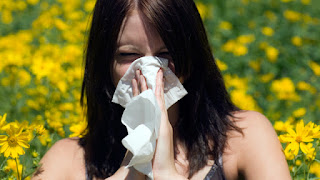While most people happily await the arrival of spring, many allergy sufferers are slightly less enthusiastic. Seasonal allergies─also called hay fever─come with pesky symptoms like an itchy throat, nose and eyes, sinus congestion, sneezing and wheezing, head and ear pressure, watery eyes, and even skin rashes. Needless to say, all this can really sap your vitality, but it doesn’t have to take you down! Before reaching for side-effect laden drugs, consider these natural tactics:
Steer clear of pollen
While pollen surrounds us─especially in spring─you can dramatically minimize your exposure. Pollen counts are highest between 5 a.m. and 10 a.m., so ideally you can schedule yard work and outdoor exercise later in the day. It also helps to shower more frequently during allergy season. Pollen can cling to skin and hair, so it’s important to clean all traces before going to bed, otherwise you’ll be exposed all night, which can worsen symptoms.
Clear your home
Open windows in warm weather invite pollen in, where it can get trapped in carpet, bedding, towels, etc. Breathing this second-hand pollen compounds symptoms for sufferers. Combat this by making “spring cleaning” a weekly affair, vacuuming, washing bedding, shaking out cushions, and dusting often. It’s also best to reduce clutter, which is highly effective at harboring dust and pollen. Consider a high-quality home air filter too.
Benefit from antioxidants
Antioxidants like vitamins C and E support the immune system to decrease seasonal allergy symptoms and colds, as well as minimizing inflammation in the body caused by free radicals which increase during allergy season.(1)(2) Enjoy fresh, whole foods and supplement these antioxidants daily to ensure adequate protection.
Sail through with fish oil
Given that inflammation is a major component of seasonal allergies, it makes sense that a powerful, natural anti-inflammatory like fish oil would be extremely beneficial. As it happens, studies back this up. One research team found fish oil to help reduce bronchial inflammation, which in turn helps to calm aggravating symptoms.(3)
Protect with MSM
Methylsulfonylmethane─better known as MSM─is not just for joint and ligament health. It also has anti-allergic properties which may be even more effective than antihistamines when it comes to seasonal allergies! One study found that MSM supplementation of 2,600 mg/day for 30 days measurably reduced allergy symptoms.(4)
Take care with food selection
During allergy season, it’s best to avoid mucus producing foods such as dairy products, sugar, wheat, and white rice. However, you have a strong ally in your daily (lactose-free) whey protein shake, which helps by stimulating production of glutathione─an extremely powerful antioxidant. In fact, according to Lorna R. Vanderhaeghe & Patrick J.D. Bouic, Ph.D., authors of The Immune System Cure, “No other antioxidant is as important to overall health as glutathione.”
These simple tactics will definitely help─especially when you combine them. Go natural, feel great!
References
1 Urol Nurs. 2008 Jun;28(3):227-8.
2 Ann Allergy Asthma Immunol. 2004 Jun;92(6):654-8.
3 Respir Med. 2010 Dec;104(12):1793-8. Epub 2010 Jul 15.
4 J Altern Complement Med. 2002 Apr;8(2):167-73.
